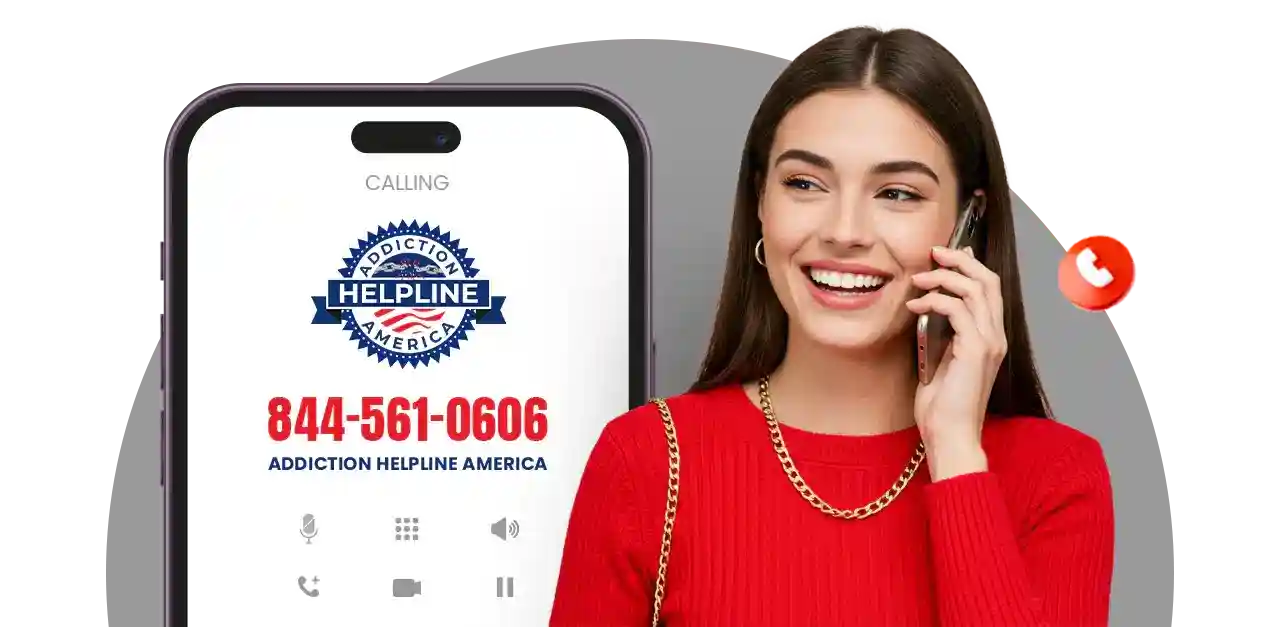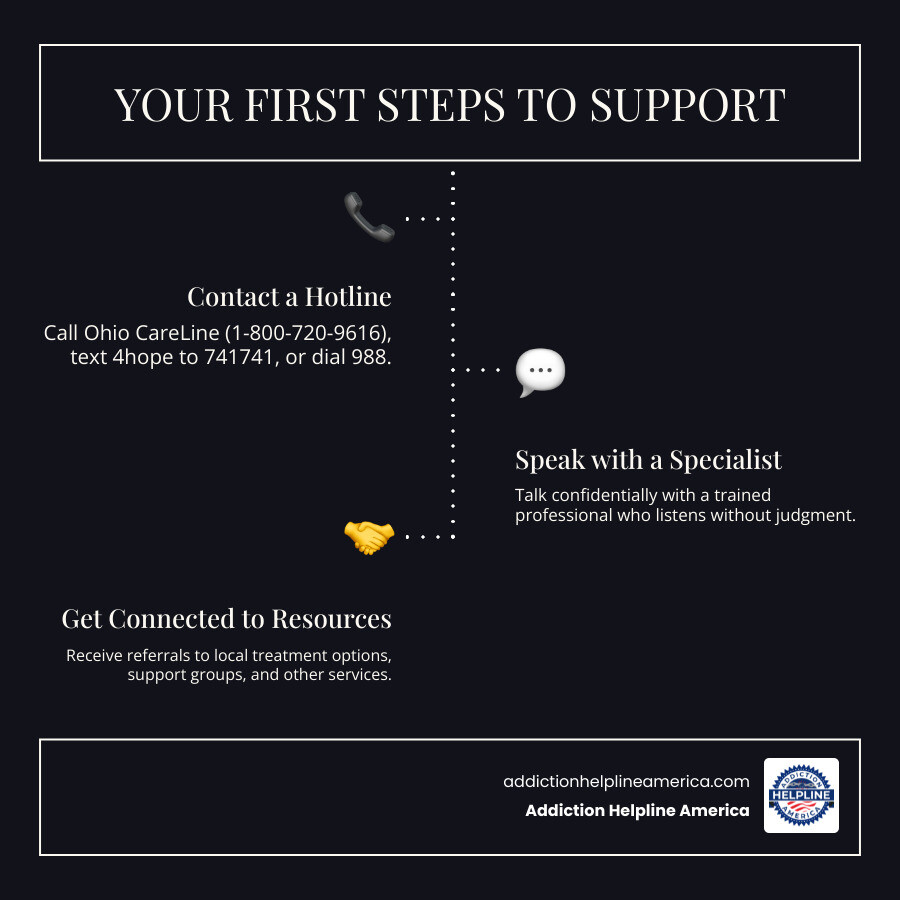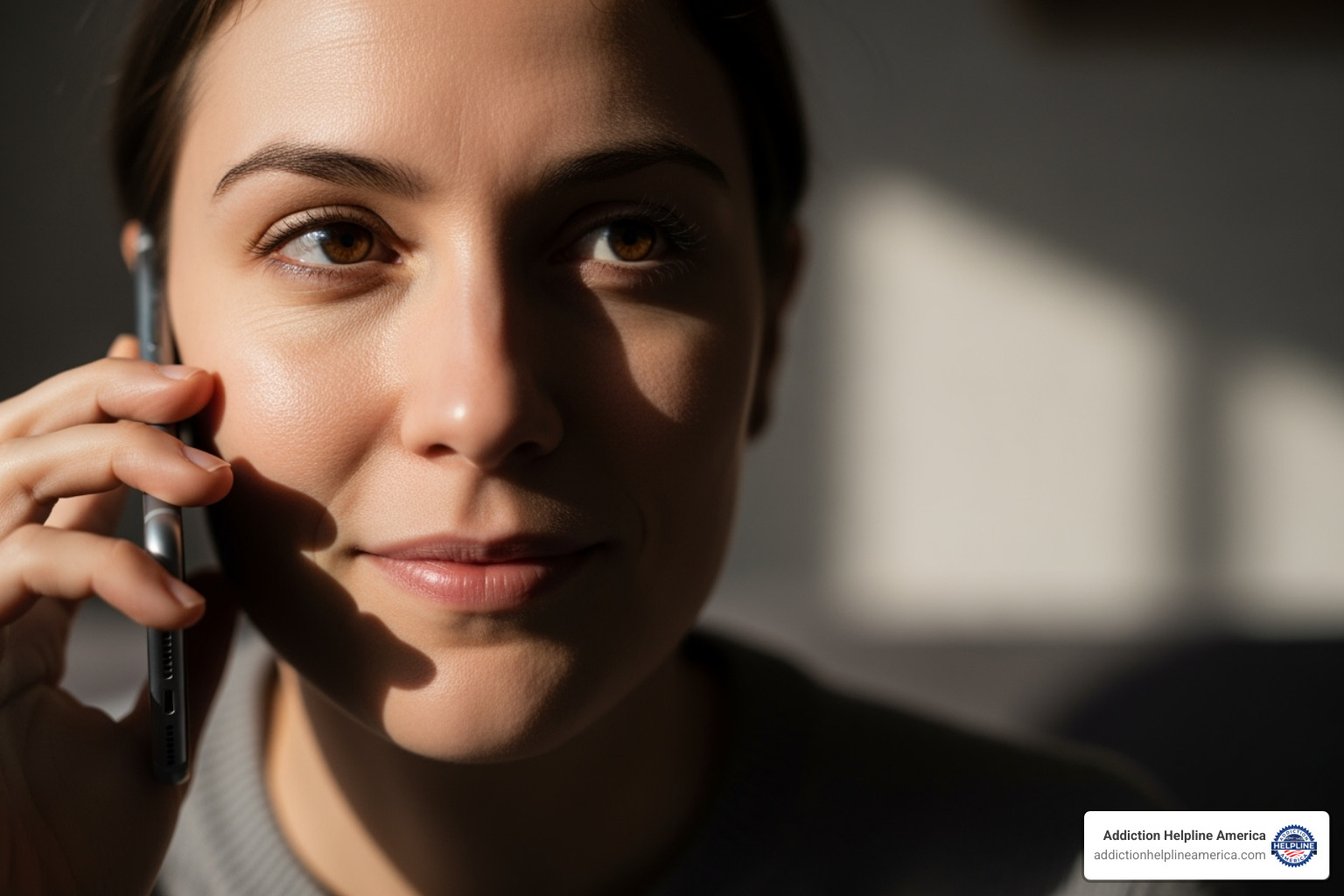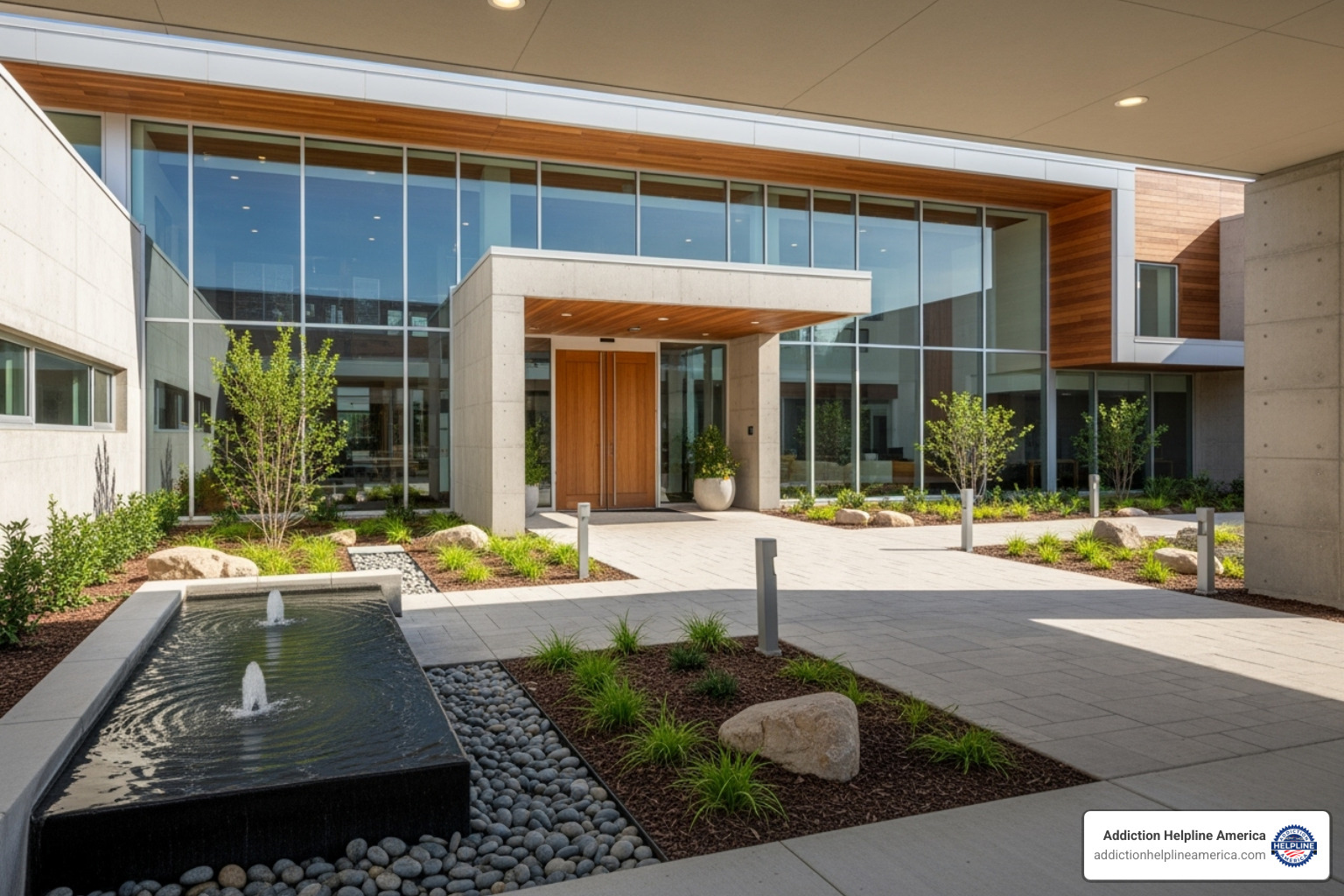
Understanding Ohio Substance Abuse & Drug Addiction Hotlines
Ohio Substance Abuse & Drug Addiction Hotlines provide immediate, confidential support for individuals and families facing addiction challenges. If you need help now, here are your primary options:
Ohio-Specific Hotlines:
- Ohio CareLine: 1-800-720-9616 (24/7, free, confidential)
- Ohio 24/7 Crisis Text Support: Text 4hope to 741741
- 988 Suicide & Crisis Lifeline: Call or text 988 (24/7/365)
National Resources Serving Ohio:
- SAMHSA National Helpline: 1-800-662-HELP (4357)
- Addiction Helpline America: 1-844-561-0606
For Life-Threatening Emergencies: Call 911 immediately if someone is overdosing or in immediate danger.
Nearly 2 million Ohioans have a mental health condition, and about a quarter received no treatment in 2021. Cost was the biggest barrier to care, with nearly 2.4 million Ohio residents living in communities that lack access to enough mental health providers. The good news? Help is available right now, and it’s confidential and free.
Substance abuse hotlines are different from emergency services. While 911 is for immediate medical crises like overdoses, hotlines connect you with trained specialists who can:
- Listen without judgment
- Help you find treatment programs
- Connect you with local resources
- Guide families through difficult conversations
- Provide ongoing support and referrals
These services operate 24/7, so you can reach out whenever you’re ready—day or night, weekday or weekend.
I’m Chris, CEO of Addiction Helpline America, and I’ve spent years connecting individuals and families with the Ohio Substance Abuse & Drug Addiction Hotlines and treatment resources they need to begin their recovery journey. Our team understands that reaching out for help is often the hardest step, which is why we’re committed to making that first call as supportive and straightforward as possible.
Immediate Help: Ohio-Specific Substance Abuse & Drug Addiction Hotlines
When you’re in crisis or finally ready to get help for substance abuse, you don’t want to wait. You need someone who understands what you’re going through—right now, in your community. That’s exactly what Ohio Substance Abuse & Drug Addiction Hotlines provide: immediate, confidential support from people who know Ohio’s resources inside and out.
These aren’t distant voices reading from a script. They’re trained professionals who connect you with local treatment options, answer your questions honestly, and help you take that scary first step toward recovery. And the best part? They’re available whenever you need them—middle of the night, holiday weekend, or Tuesday afternoon.
Ohio CareLine: 1-800-720-9616
The Ohio CareLine is run by the Ohio Department of Mental Health & Addiction Services (OhioMHAS), which means it’s built specifically for Ohioans. When you call 1-800-720-9616, you’re not just getting generic advice—you’re talking to someone who knows what resources exist in your county, which facilities have openings, and how to steer Ohio’s behavioral health system.
This line operates 24/7, because crises don’t follow business hours. The behavioral health professionals who answer are trained to provide empathetic support without judgment. They’ll listen to what you’re going through, help you understand your options, and connect you with local mental health resources that fit your specific situation.
Everything you share is completely confidential and free. You won’t get a bill, and you won’t have to worry about who finds out you called. It’s a safe space to be honest about what you need.
Ohio 24/7 Crisis Text Support: Text 4hope to 741741
Not everyone feels comfortable talking on the phone, especially when emotions are running high. If you’d rather text, Ohio has you covered. Just send the word 4hope to 741741, and you’ll be connected with a trained crisis counselor—usually within five minutes.
This service runs 24/7 and offers confidential, text-based support for substance abuse crises, mental health emergencies, and everything in between. You can take your time typing out what’s happening, re-read responses, and have the conversation at your own pace. Sometimes that feels safer than hearing a voice on the other end.
It’s immediate assistance that fits in your pocket, available whenever you need it.
988 Suicide & Crisis Lifeline: Call or Text 988
The 988 Suicide & Crisis Lifeline is a national service, but when Ohioans call or text 988, they’re connected to a local crisis center whenever possible. That means the person who answers understands your community and can point you toward Ohio-specific resources.
This three-digit number was designed to be as easy to remember as 911, because getting help for an addiction or mental health crisis should be just as straightforward as calling for an ambulance. Trained specialists are available 24/7/365 to provide free and confidential support for people in distress.
Whether you call, text, or chat online, you’ll find compassionate help on the other end. The 988 Lifeline connects people to mental health and substance abuse resources across the country. You can learn more about how it works at 988lifeline.org.
If you’re a veteran, press 1 after dialing 988 to reach the Veterans Crisis Line, which offers specialized support for service members and their families.
National Hotlines and Resources Serving Ohioans
Ohio residents have access to much more than just state-specific services. A strong network of national hotlines extends its reach across the country, offering specialized support, extensive treatment referrals, and 24/7 assistance that complements local efforts. These resources bring decades of experience and nationwide connections right to your fingertips.
Addiction Helpline America: 1-844-561-0606
When you call Addiction Helpline America at 1-844-561-0606, you’re not just getting a referral—you’re getting a partner in your recovery journey. Our admissions navigators take the time to understand your unique situation, answer your questions honestly, and help you find treatment options that actually fit your life.
We connect Ohio residents to a vast network of treatment facilities across the state and beyond. Whether you’re looking for inpatient care, outpatient programs, or medication-assisted treatment, we can point you in the right direction. We also help you locate support groups and community-based services that provide ongoing encouragement after initial treatment.
Cost shouldn’t stand between you and recovery. Our team can help you understand your insurance coverage, find sliding-scale payment options, and identify programs that work within your budget. And because we know that addiction doesn’t discriminate, we offer assistance in both English and Spanish to ensure everyone can access the help they deserve.
Every call is completely free and confidential. No judgment, no pressure—just real guidance from people who genuinely want to see you succeed. Get help for substance abuse by calling us today.
Specialized National Support Hotlines
Sometimes the most effective help comes from people who truly understand your specific situation. That’s why specialized national hotlines exist—to provide targeted support for different communities and circumstances.
SAMHSA’s National Helpline at 1-800-662-HELP (4357) is one of the most comprehensive resources available. The Substance Abuse and Mental Health Services Administration operates this free, confidential helpline 24/7, connecting callers with treatment referrals, support groups, and community services throughout Ohio and nationwide. Their counselors can answer questions about mental health and substance use disorders for both individuals and families. Learn more at samhsa.gov/find-help/national-helpline.
Veterans and service members deserve support from people who understand military culture. By dialing 988 and pressing 1, you’ll reach the Veterans Crisis Line, where many responders are veterans themselves. They provide confidential support through the Department of Veterans Affairs, available 24/7. Visit veteranscrisisline.net for additional resources.
When someone you love is struggling with alcohol addiction, you need support too. Al-Anon and Alateen at 1-800-356-9996 offer guidance to family members and teens affected by another person’s drinking. Their counselors connect you with local support groups where you can share experiences with others who understand. Find meetings near you at al-anon.org/al-anon-meetings/, and teens can get specialized help at al-anon.org/newcomers/teen-corner-alateen/.
The LGBTQ+ National Hotline at 1-888-843-4564 provides free, confidential support custom to the LGBTQIA+ community. Counselors understand the unique challenges you may face and can connect you with affirming local resources. They’re available Monday through Friday from 1pm to 9pm, and Saturday from 9am to 2pm, Pacific time. More information is available at lgbthotline.org.
Mental health and addiction often go hand in hand. The National Alliance on Mental Illness (NAMI) offers peer support through their helpline at 1-800-950-NAMI (6264), or you can text “Helpline” to 62640. Whether you’re living with a mental health condition yourself or supporting a loved one, NAMI’s trained volunteers provide practical resources and compassionate guidance. Visit nami.org/home to explore their full range of services.
These Ohio Substance Abuse & Drug Addiction Hotlines and national resources work together to create a safety net that’s there whenever you need it. No matter who you are or what you’re facing, there’s a hotline designed to understand your situation and help you move forward.
Recognizing the Need for Help and How to Respond
One of the most challenging aspects of substance abuse is recognizing that there’s a problem. Whether it’s for yourself or a loved one, understanding the signs and knowing how to respond, especially in an emergency, is crucial.
How to Know if You or a Loved One Needs Help
Addiction is a chronic disease that changes the brain and alters decision-making. It’s not a moral failing, but a medical condition that requires treatment. Brief screenings are often a useful tool for identifying potential substance abuse issues. If you’re unsure whether you or someone you care about might have a problem, consider these indicators:
- Inability to control use: Despite negative consequences, the individual continues to use the substance.
- Cravings: Intense urges to use the substance.
- Changes in habits: This can include fatigue, changes in sleep patterns, weight loss, low libido, and neglect of personal hygiene or exercise.
- Flu-like symptoms: Often associated with withdrawal from certain substances.
- Social isolation: Withdrawing from friends, family, and activities once enjoyed.
- Neglect of responsibilities: Failing to meet obligations at work, school, or home.
- Continued use despite harm: Using substances even when it causes physical or psychological problems.
For opioid abuse specifically, look for signs such as intense cravings, inability to control opioid use, fatigue, changes in sleep patterns, weight loss, flu-like symptoms, low libido, and isolation. You can find more detailed information on the signs of opioid abuse at hopkinsmedicine.org/opioids/signs-of-opioid-abuse.html. If these signs resonate with your situation or that of a loved one, reaching out to one of the Ohio Substance Abuse & Drug Addiction Hotlines is a vital first step.
What to Do in an Overdose Emergency
It’s critical to understand the difference between seeking support from Ohio Substance Abuse & Drug Addiction Hotlines and responding to an immediate medical emergency.
| Situation | Action to Take
Finding Treatment and Long-Term Support in Ohio
Making that first call to a hotline is brave—and it’s just the beginning. Real recovery happens over time, with the right combination of treatment, ongoing support, and sometimes a little trial and error to find what works for you. The good news? Ohio has built a strong network of treatment facilities, support groups, and affordable programs designed to walk alongside you and your family through every step of healing.
Free & Low-Cost Ohio Substance Abuse & Drug Addiction Hotlines and Programs
Let’s be honest: money shouldn’t stand between you and getting help. But for too many Ohioans, it does. Nearly 2.4 million people in our state live in areas where mental health providers are scarce, and cost was the number one reason people didn’t get care in 2021. That’s not okay—but it’s also not the end of the story.
Ohio Substance Abuse & Drug Addiction Hotlines exist partly to help you steer around these barriers. When you call the Ohio CareLine, Addiction Helpline America, or SAMHSA’s National Helpline, the people on the other end aren’t just there to listen. They can connect you with state-funded programs, non-profit organizations, and treatment centers that offer sliding-scale fees based on what you can actually afford.
For example, many faith-based residential programs help people rebuild their lives through character development and mentoring. Often, these programs offer services on a sliding scale or completely free, removing one of the biggest obstacles to getting help. Similarly, many community behavioral health centers provide inpatient, outpatient, and residential treatment for substance use disorders and mental health conditions. They often prioritize vulnerable populations—such as pregnant women or IV drug users—and offer sliding scale fees and free services for those without insurance or the ability to pay.
When you reach out to a hotline, ask directly about payment options. Ask about insurance navigation. Ask about free or low-cost services. These questions aren’t a burden—they’re exactly what the hotline staff are there to help you answer.
Locating Treatment Centers and Medication-Assisted Treatment (MAT)
Most treatment falls into a few main categories. Inpatient or residential treatment means you live at the facility for weeks or months, receiving 24/7 care in a structured, supportive environment. This option is ideal if you need intensive support, medical detox, or a complete break from your usual surroundings. Outpatient treatment lets you live at home while attending therapy sessions and group meetings regularly. Depending on how much support you need, this could mean intensive outpatient programs (IOP), partial hospitalization programs (PHP), or standard weekly counseling. Many people start with inpatient care and transition to outpatient as they stabilize.
If you’re physically dependent on substances, medical detox is often the first step. This medically supervised process helps you withdraw safely, managing uncomfortable or dangerous physical symptoms with professional care.
Medication-Assisted Treatment (MAT) deserves special attention because it’s one of the most effective, evidence-based approaches available—especially for opioid and alcohol addiction. MAT combines medications like buprenorphine, methadone, or naltrexone with counseling and behavioral therapies. Research consistently shows that MAT improves survival rates, keeps people in treatment longer, and significantly reduces illicit drug use.
When you call Ohio Substance Abuse & Drug Addiction Hotlines like ours at Addiction Helpline America, we can help you find treatment facilities in Ohio that offer MAT. SAMHSA also provides searchable directories to find practitioners who prescribe buprenorphine and Opioid Treatment Programs (OTPs) that offer methadone. You can explore these resources at samhsa.gov/medications-substance-use-disorders and the Opioid Treatment Program Directory at dpt2.samhsa.gov/treatment/.
Our team takes the time to understand your situation—what substances you’re using, whether you have co-occurring mental health conditions, what your daily life looks like—and then we guide you toward programs that actually make sense for you.
Support Groups for Individuals and Families in Ohio
Here’s a truth that might surprise you: some of the most powerful healing happens not in a therapist’s office, but in a circle of folding chairs with people who get it. Support groups offer something clinical treatment can’t—the lived experience of others who’ve walked your path and come out the other side.
Alcoholics Anonymous (AA) has been helping people with drinking problems since 1935, and Ohio has hundreds of meetings happening every week. You can find local meetings or join online support at aa.org/find-aa. Narcotics Anonymous (NA) does the same for people recovering from drug addiction, whether prescription or illegal substances. Find an NA meeting, helpline, or online support group at na.org/meetingsearch/.
If you’re the family member or friend of someone struggling with addiction, you need support too. Al-Anon provides a space for people affected by someone else’s drinking to share their experiences and learn coping strategies. Find an Al-Anon meeting in your area at al-anon.org/al-anon-meetings/. Alateen, part of Al-Anon, specifically helps teenagers dealing with a loved one’s alcoholism—resources are available at al-anon.org/newcomers/teen-corner-alateen/. Nar-Anon offers similar support for those affected by someone’s drug use. Search for a Nar-Anon meeting in your area at nar-anon.org/find-a-meeting.
SMART Recovery takes a different approach, using self-empowerment and cognitive-behavioral techniques rather than the 12-step model. It helps young people and adults with alcohol or other addictions through group therapy focused on building coping skills. Find SMART Recovery meetings in person or online at meetings.smartrecovery.org/meetings/.
These groups meet all across Ohio—in churches, community centers, hospitals, and online. Many people attend multiple meetings a week because the shared understanding and mutual encouragement become a cornerstone of their recovery. You don’t have to do this alone.
Frequently Asked Questions about Ohio Substance Abuse Hotlines
When you’re thinking about reaching out for help, it’s natural to have questions. We’ve been connecting people with treatment for years, and these are the questions we hear most often about Ohio Substance Abuse & Drug Addiction Hotlines.
What services do Ohio substance abuse & drug addiction hotlines offer?
Think of Ohio Substance Abuse & Drug Addiction Hotlines as your first door into a whole network of support. When you call, you’re not just getting someone to listen—though that’s incredibly important. You’re getting connected to real solutions.
Crisis support is available when you’re in an immediate mental health or addiction crisis. The trained specialists on the other end of the line know how to help you through those darkest moments. They provide emotional support too, offering empathetic, non-judgmental conversations when you’re struggling with the weight of addiction.
But hotlines do more than just listen. They connect you with treatment referrals to suitable facilities—whether that’s inpatient care, outpatient programs, or medication-assisted treatment options right here in Ohio or across the country. If you need detox information, they’ll guide you toward safe, medically supervised detoxification and explain what to expect.
Family members call these hotlines too, looking for guidance on how to help someone they love. The operators understand that addiction affects entire families, not just individuals. They’ll direct you to local Ohio resources like support groups, community-based services, and other organizations that can provide ongoing assistance. And if you simply have questions—about addiction itself, treatment options, or what recovery looks like—they’ll take the time to educate you.
Are calls to addiction hotlines in Ohio confidential?
Yes. Full stop. Your privacy is protected by law and ethical standards.
Every reputable Ohio Substance Abuse & Drug Addiction Hotline—including Addiction Helpline America—treats your conversations as completely confidential. This isn’t just a promise; it’s a fundamental part of how these services operate. You can speak openly about your struggles, your fears, and your questions without worrying that anyone will find out.
This confidentiality creates a safe space where you can be honest without fear of judgment or exposure. Your information won’t be shared without your explicit permission. Recovery starts with being able to talk freely about what’s really happening, and these hotlines make that possible.
How can I help a loved one who is struggling with addiction in Ohio?
Watching someone you care about struggle with addiction is heartbreaking. You want to fix it, to make it stop, but addiction doesn’t work that way. Here’s what you can do.
Start by calling family support hotlines like Al-Anon or NAR-Anon. You can also reach out to any of the Ohio Substance Abuse & Drug Addiction Hotlines for advice on how to approach your loved one. These conversations will give you practical strategies that actually work.
Educate yourself about addiction as a medical disease, not a moral failing. Understanding what’s happening in your loved one’s brain and body helps you respond with compassion instead of frustration. Learn about the available treatment options so you can have informed conversations.
Here’s the hard truth: you can encourage treatment, but you can’t force it. People enter recovery when they’re ready, not when we want them to be ready. Express your concerns calmly and lovingly. Share information about treatment options. But avoid shaming or blaming—it usually backfires.
Offer practical support in concrete ways. Drive them to appointments. Help research treatment centers. Be a sober, stable presence in their life. Sometimes the most powerful thing you can do is simply show up consistently.
And please, prioritize your own mental health. Supporting someone with addiction is emotionally exhausting. You’re not helping anyone if you burn out. Seek your own therapist or join a family support group. Put on your own oxygen mask first.
Remember: you didn’t cause their addiction, you can’t control it, and you can’t cure it. But you can love them, support them, and connect them with the professional help available through Ohio Substance Abuse & Drug Addiction Hotlines and treatment facilities. That’s not nothing. That’s everything.
Your Path to Recovery Starts With a Single Call
When you look at the numbers—nearly 2 million Ohioans living with mental health conditions, countless families touched by addiction—it’s easy to feel overwhelmed. But here’s what those statistics really tell us: you are not alone. Not even close.
Every single day, people just like you take that first brave step toward recovery. They pick up the phone, send a text, or make a call. And their lives begin to change.
Recovery is possible. It’s not just a hopeful statement—it’s a proven reality. People do get better. Families do heal. Lives do transform. But it all starts with reaching out.
The Ohio Substance Abuse & Drug Addiction Hotlines we’ve discussed throughout this guide exist for one reason: to make that first step as easy and supportive as possible. Whether you call the Ohio CareLine, text 4hope to 741741, or dial 988, there’s always someone ready to listen. No judgment. No pressure. Just compassionate support and practical guidance.
At Addiction Helpline America, we’ve walked alongside thousands of people on their recovery journeys. We understand that making that first call can feel scary. You might worry about what to say, whether you’re “bad enough” to need help, or what comes next. Those feelings are completely normal, and our team is trained to meet you exactly where you are. When you call us, you’re not just getting a referral service. You’re connecting with people who genuinely care about your wellbeing and who have the knowledge and resources to help you find the right path forward. We’ll take the time to understand your unique situation, answer your questions, and guide you toward treatment options that fit your needs and circumstances.
The path to recovery doesn’t have to be walked alone. Support is available right now—confidential, free, and just a phone call away. Don’t let another day pass wondering if things can get better. They can, and they will.
Your brighter future is within reach. Find the right addiction and rehab hotline for you and take that first courageous step today.
Our helpline is 100%
free & confidential
If you or someone you care about is struggling with drug or alcohol addiction, we can help you explore your recovery options. Don’t face this challenge alone—seek support from us.
Programs
Resources
Will my insurance
cover addiction
treatment?
We're ready to help
Find the best
drug or alcohol treatment
center
Are you or a loved one struggling with addiction? Call today to speak to a treatment expert.

















